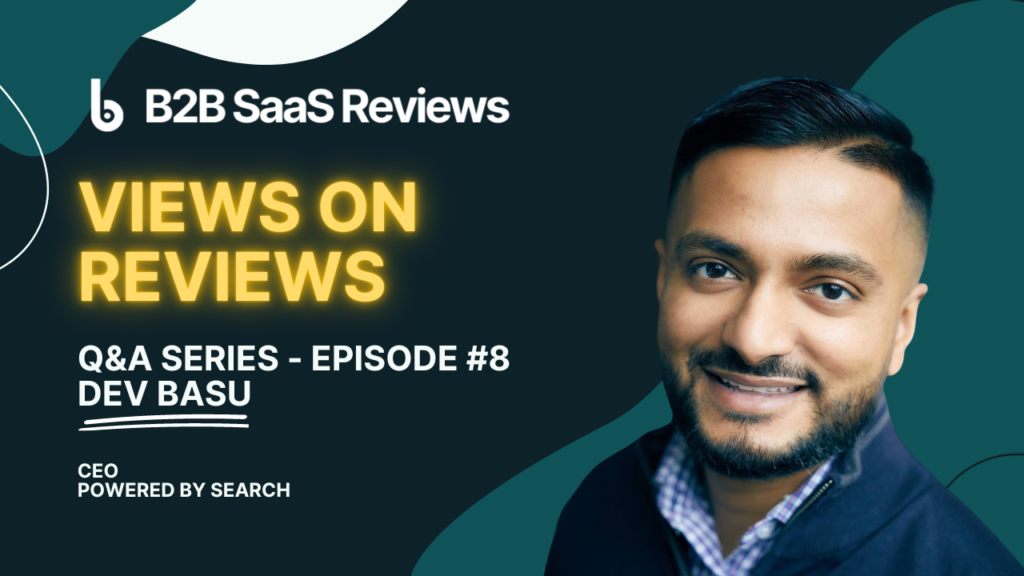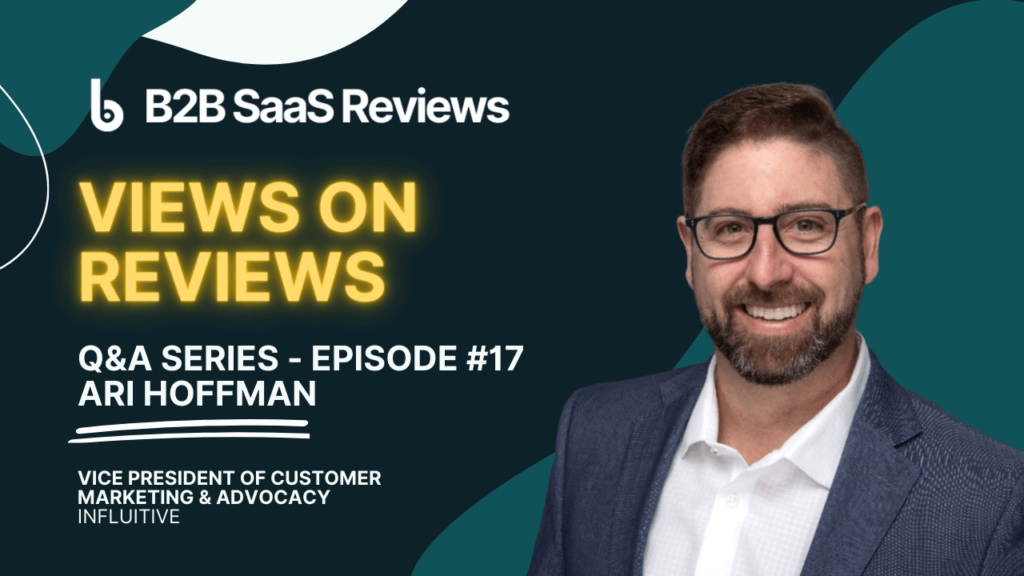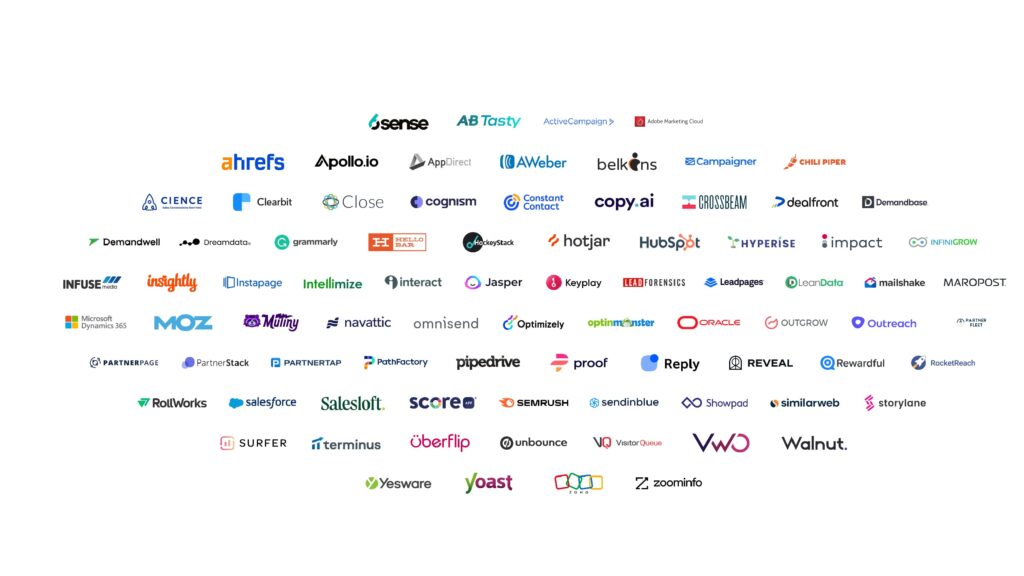Views on Reviews is a new series of interviews with B2B SaaS professionals who will provide a real-world perspective on what it’s like working on reviews. My eighth interview is with Dev Basu, CEO of Powered By Search.

Dev Basu founded and runs Powered By Search, a top agency that helps B2B SaaS companies scale demand generation to drive demos, trials, and grow MRR.
Powered By Search has helped dozens of B2B SaaS companies, such as Basecamp, CallRail, Clio, Loopio, and TouchBistro.
Dev’s known by his peers, colleagues, and clients as:
- a world-class expert when it comes to scaling B2B SaaS marketing
- one of a select few digital marketing experts that understands the big picture as well as what it takes to get things done
- when you think of a person within the digital space with a wealth of knowledge both applied and innovative, Dev comes to mind
Without further ado, here are Dev’s views on reviews.
1. Powered By Search got started as an SEO agency and has evolved into a B2B SaaS Marketing Agency. How did you get into B2B SaaS?
Answer: Our first client was a virtual data room client back in 2010. Of all our clients, we loved B2B more than B2C, and within B2B, SaaS clients were the savviest, and most fun people to work with.
2. What was your first experience with reviews in business software?
Answer: We used to run into software directories as search competitors for clients for whom we did content marketing and SEO work. We enjoyed beating them at their own game.
3. Have you yourself looked at reviews on a business software review site before purchasing? If yes, tell us how you got to the site, what you looked at, etc.
Answer: Yes, we have and they are useful for sure. I think it’s been a 50% mix of Googling vs just going to G2 or Capterra.
4. How do you see reviews fit into a broader demand gen strategy?
Answer: It’s a lead conversion tool vs a lead acquisition tool. Super important to have social proof that is objectively believable.
5. You’ve worked with many B2B SaaS companies over the past 10-15 years. What are some of the most common questions that your B2B SaaS clients ask you about reviews and review sites?
Answer: There’s a whole range of questions that usually proceed in this order: How can we ask for reviews without bugging our customers too much? How do we prevent getting bad reviews? (this is the wrong question to ask) Which sites matter? If we could only focus on one, which one would it be? Do review sites affect our rankings on Google? Is it worthwhile to invest in something like Capterra Ads?
6. As a search expert in B2B SaaS, is there any way a vendor can outrank a review site on a B2B SaaS product category search? If not, how do you advise B2B SaaS companies view review sites in the context of search results for key buying terms like “best + [B2B SaaS category]” searches?
Answer: Yes! In fact, the presence of a review site for a “[category] + software” search is usually indicative of fertile ground for brands to own the SERP (search engine results page). The easiest way to do this is by creating page(s) extremely tailored to the search intent, and then promoting those pages. It’s also important to go with the flow of what Google wants. In a query like “best + [category] software”, the intent isn’t to find a single vendor, but to find comparisons between multiple vendors. To address this intent, we typically work with clients to create blog posts or well-designed pages that help the right type of customer choose their platform, while providing a nod to other types of customers that may be suited for other platforms. For example, say you’re Chili Piper and you offer a meeting booking platform. Compared to Calendly, the install base is largely made up of sales teams with multiple reps and complex lead routing. Therefore, rank for “best meeting booking tools”, they could simply include a list that includes themselves, Calendly, and others like Doodle and point out which platform is the best fit for a specific persona.
7. You’ve said, “Most B2B SaaS companies have a love-hate relationship with review sites.” From what I gathered, you argue the love comes from recognizing the importance of these sites (?), and the hate comes from seeing the review sites in a “limited scope…reputation management and driving more reviews are often their sole objectives. This is especially the case for smaller, up-and-coming SaaS businesses that see themselves as underdogs within their category (?) In other words, when it comes to how B2B SaaS vendors view review sites, do you think the view is, love ‘em if you can lead (on them), and hate ‘em if you can’t?
Answer: I think startups naturally have a lot of hats to wear and dedicating a CSM function or engineering the product to prompt an ask for reviews takes a backseat to building the product, acquiring more customers, and improving go-to-market strategy. The view isn’t so much of hating ‘em if they can’t participate, but rather just deferring participation till it becomes a priority. The rub is that by the time it becomes a priority, there’s a lot of inertia to build a critical mass of reviews.
8. You see review sites as treasure troves of competitive intel for B2B SaaS vendors and have written a helpful post. What prompted you to see review sites from this different angle (i.e. competitive intel)?
Answer: I think a lot of marketers evangelize ‘talking to customers’ but very few actually do it. So in the absence of these 1:1 conversations, review sites play an important role in being able to get competitive intelligence that can help you chisel and refine your positioning.
Are you using SaaS review sites like G2 and Capterra for competitive intelligence? Our recent article covers how to use these platforms for:
— Dev Basu 🇨🇦/🇮🇳/🌎 (@devbasu) January 21, 2021
✅ Refining SaaS positioning
✅ Content ideation and sales enablement
✅ Optimizing PPC strategyhttps://t.co/GwwxJFYzIy
9. You’ve also said, “Many companies, though, scoff at the idea of allocating PPC ad budget to review sites due to the risk of becoming a commodity. Running PPC ads on review sites tends to result in lower quality leads, who often ask for discounts. This invariably creates a race to the bottom, which isn’t ideal for their return on ad spend.” Review sites like Capterra that offer PPC ads have a bidding system similar to Google Ads (minus the quality score until very recently). How is running PPC ads on a review site different than on Google? (i.e. not also seen as a risk of becoming a commodity, resulting in lower quality leads, who often ask for discounts, and creating a race to the bottom.)
Answer: The problem isn’t in the PPC platform itself, but rather the intent with which buyers tend to ‘pick from a list.’ Capterra Ads work rather well, but you have to have the appetite to answer an RFP-style buyer that will naturally lend to a longer sales cycle. The juice can be worth the squeeze if the B2B SaaS company has the ability to field these requests, and also has a solid playbook for discount/concession-oriented objection handling.
10. How do you recommend B2B SaaS companies think about if and how to run PPC ads on review sites (like Gartner Digital Markets review sites (Capterra, GetApp, and Software Advice)?
Answer: There’s a trade-off between velocity of lead generation vs quality of lead conversion. We see this as a ‘yes and’ conversation rather than having to pick and choose between Google, Linkedin, and other channels vs review site PPC platforms. Typically, we recommend allocating 10-20% of overall media spend budgets to keep the pipeline full of closer-to-close customers who are already solution-aware but may lack product-awareness.
11. With podcasts proliferating in B2B SaaS, it’s becoming more competitive to stand out. I noticed you’re asking for reviews of the two podcasts you’ve started up at Powered by Search (SaaS Marketing Bites and Insider Marketing.) How are reviews helping grow your podcast audience?
Answer: On platforms like Apple Podcasts, review count and review velocity play a role in podcats rankings, so it’s a natural play to ask for reviews from raving fans. It’s not the only factor though, and we’ve found that our podcast consistently grows in listenership through the merits of having engaging content.
I love how @iammarcthomas is running the 2 podcasts we've started up at Powered by Search.
— Dev Basu 🇨🇦/🇮🇳/🌎 (@devbasu) May 12, 2021
If you haven't listened yet please subscribe and leave us a review https://t.co/nyCeMvu9P1
12. A Google search for “Powered By Search reviews” yields Glassdoor (employee reviews) as the 1st result and Clutch (Services company reviews) as the 2nd result. You’ve generated employee reviews on Glassdoor but not customer reviews on Clutch. Can you tell us how you see employee reviews and customer reviews in the context of your agency?
Answer: Employee reviews are supremely important, not just for talent acquisition but we actively encourage future clients to look at the options they are considering when working with a demand generation partner like ourselves. Agencies with poor Glassdoor ratings have a lot of churn in staff, which is well correlated to having a revolving door of clients. It’s on the client to choose wisely. We probably should spend more time investing in Clutch, but have made more of a strategic decision to invest in client case studies that add more context and still have testimonials, vs only asking clients to add testimonials on something like Clutch.
13. How do you decide which review sites to ask your users to review on?
Answer: We focus on building a base on one site at a time and then scaling up on others vs being shallow on multiple sites.
14. Are you seeing any change in where you or your B2B SaaS growth professionals go for user reviews? i.e. not to review sites, but to your own personal network directly, or to peer networks in Slack communities?
Answer: Yes, most definitely. I think savvy buyers are aware of the inside baseball involved with review site PPC, awards and rankings, and even the way analyst reviews and quadrants work. There’s a whole movement for private peer-to-peer sentiment that is more powerful in some ways.
15. I counted 27 resources on your SaaS Marketing Resources page, one of which is an “Online B2B SaaS Reputation Management Checklist.” One of the items on the checklist is “set up a review funnel which encourages reviews, feedback, & testimonials from your customers.” Can you elaborate on how you recommend B2B SaaS companies set up a review funnel?
Answer: Yes, we strongly encourage clients who use NPS or CSAT surveys funnel promoters and detractors differently. The best time to ask a customer for something is when they’re happy, so requesting reviews from high-NPS scorers lends to a high follow-through in getting reviews.
16. Have you used buyer intent data from review sites? If so, how?
Answer: Yes, largely to power ABM-based campaigns, with great results.
17. If you could change one thing about today’s B2B software review sites, what would it be?
Answer: The comparison tables! They suck.
18. You’re an avid (and skilled) photographer. Mind sharing with us one of your favourite photos?
Answer: Here's one, somewhere in Iceland, coming back down from summiting a small 1000m mountain.

Key Takeaways:
- It is possible to rank on your “[category] + software” search terms by creating a page(s) highly tailored to the search intent and then promoting those pages.
- Review sites can play an important role in gaining competitive intelligence that can help you refine your positioning.
- As a rule of thumb, allocate 10-20% of overall media spend budgets on building a pipeline with your already solution-aware audience but product unaware. That is, they know they have a problem, and there are solutions for it but they don’t know the specific solutions from which they’ll need to pick. Pay-per-click advertising on review sites is one way to reach your audience members at this stage of the buying process.
- The best time to ask a customer for something is when they’re happy, so requesting reviews from high-NPS scorers tends to lead to more reviews.
- Reviews tend to be more of a lead conversion tool than a lead acquisition tool. Reviews can provide objectively believable social proof to boost lead conversion rates.
Do you have follow-up questions for Dev? Add and message him on LinkedIn or find him on Twitter.
To learn more about Dev’s agency, visit poweredbysearch.com.
Get more of Dev’s views on SaaS Marketing Bites and Inside Marketing podcasts.
If you’d like to share your experience generating, leveraging, or measuring B2B SaaS reviews, please email me: joe@b2bsaasreviews.com
Authors
-

I'm the Founder and Editor-In-Chief of B2B SaaS Reviews and the Director of Demand Generation at PartnerStack, the leading platform for partner management and affiliate marketing in B2B SaaS. My experience spans several notable B2B SaaS companies, including Influitive (Advocate Marketing), LevelJump (Sales Enablement, acquired by Salesforce), and Eloqua (Marketing Automation, acquired by Oracle). I hold a Bachelor of Commerce in Marketing Management from Toronto Metropolitan University and a Master of International Business from Queen's University, with academic exchanges at Copenhagen Business School and Bocconi University.
-





